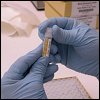|
||||||||||

 Iodine deficiency disorders are thought to affect more than a billion people worldwide. Accurate laboratory tests can detect iodine deficiency. Urinary iodine (UI) analysis is the most common method used, worldwide, for assessing the iodine status of a population. Ensuring the Quality of Iodine Procedures (EQUIP) is a standardization program that addresses laboratory quality-assurance issues related to testing for iodine deficiency. CDC's EQUIP program currently assists more than 84 iodine laboratories in more than 50 countries. CDC provides each laboratory with quality-control materials, analytical guidelines, and technical training and consultation so that these laboratories can accurately measure iodine levels in their national surveys. Three times a year, CDC sends participating laboratories EQUIP samples for analysis.
Iodine deficiency disorders are thought to affect more than a billion people worldwide. Accurate laboratory tests can detect iodine deficiency. Urinary iodine (UI) analysis is the most common method used, worldwide, for assessing the iodine status of a population. Ensuring the Quality of Iodine Procedures (EQUIP) is a standardization program that addresses laboratory quality-assurance issues related to testing for iodine deficiency. CDC's EQUIP program currently assists more than 84 iodine laboratories in more than 50 countries. CDC provides each laboratory with quality-control materials, analytical guidelines, and technical training and consultation so that these laboratories can accurately measure iodine levels in their national surveys. Three times a year, CDC sends participating laboratories EQUIP samples for analysis.